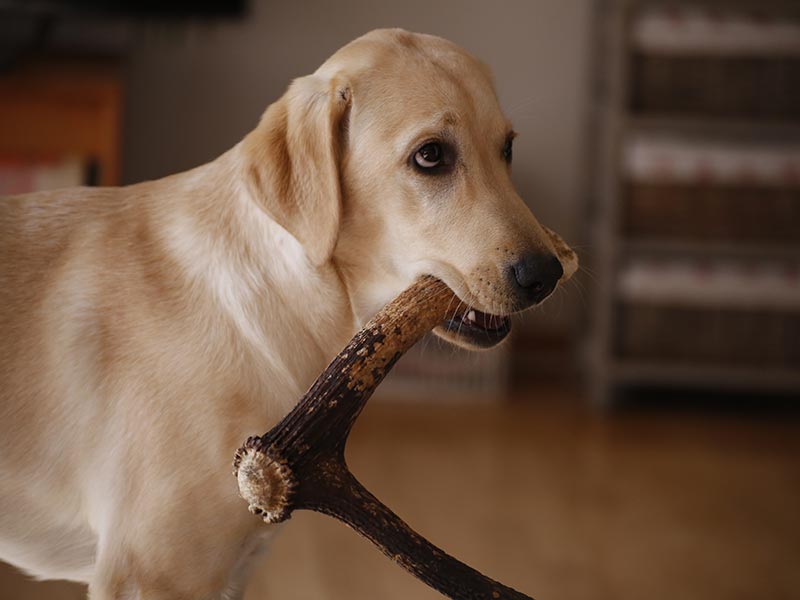Dogs and bones, it seems like a match made in heaven. We see it in cartoons, movies, and even in our daily conversations. But when it comes to antlers, are they a safe option for our furry friends to chew on? Let’s dive into the details and find out.
At first glance, antlers seem like the perfect chew object for our pets. They don’t splinter as easily as bones or other toys, they last a long time, and they align with our perception of what’s natural for our dogs. However, there are a few hazards to consider before purchasing that antler treat you’ve been eyeing at the pet store.
Different Types of Antler Chews for Dogs
Natural antler dog chews come from various sources, each with different textures. Deer antlers, for instance, can be harder compared to other varieties. You can choose from a wide range of sizes to find the perfect fit for your dog’s size and chewing behavior. Elk antlers are typically large and sometimes available in a split form. Moose antlers, on the other hand, are softer, while “antler” chews made from water buffalo horns are also available.
Dental Health and Antlers for Dogs
One of the reasons many dog owners opt for hard chews like antlers is to maintain their dogs’ dental health. Chewing helps reduce plaque and tartar buildup and redirects destructive tendencies and anxiety. However, it’s crucial to note that antlers and excessively hard chews can cause broken teeth in dogs. A broken tooth is not only extremely painful but can also lead to abscesses and infections, resulting in expensive dental bills.
Avoiding Health Complications from Antlers
While dental problems are a common issue associated with antlers, the most serious complications can occur internally. If antlers break or splinter, they can become lodged in your dog’s mouth, throat, or intestines, potentially causing dangerous blockages that may require emergency surgery. Dogs left unsupervised while chewing antlers are particularly at risk since you may not realize they have swallowed part of the antler until symptoms appear or even worse, choking occurs.
But My Dog Loves Antlers!
It’s essential to remember that not all dogs will experience problems with antlers. Some owners give antlers to their dogs for years without any issues. However, this doesn’t guarantee that antlers are safe, regardless of how much your dog loves them. If you do choose to give your dog an antler, it’s highly recommended to supervise them while they chew on it (or any chew toy).
Alternatives to Antlers for Dogs
With concerns surrounding the safety of bones, antlers, rawhide, and other chews, it can feel like nothing is entirely safe for dogs. If you’re worried about your dog’s ability to safely chew antler treats, consider purchasing chew toys that offer little flexibility. Additionally, choose toys that don’t fit completely into your dog’s mouth to protect against choking and obstruction. Your veterinarian can provide recommendations for safe chew toys, and you can also refer to the Veterinary Oral Health Council for a list of veterinarian-approved options.
No matter what chew toy or object you decide to go with, always ensure it’s the right size for your dog. Stay informed about any recalls, particularly for jerky chews or food products. Your dog’s safety and well-being should always be the top priority.
Frequently Asked Questions
Q: Are antlers safe for dogs to chew on?
A: While antlers may seem like a great chew option, they come with potential risks. They can cause broken teeth and dangerous internal blockages if they break or splinter. It’s essential to supervise your dog while they chew on antlers.
Q: What are the alternatives to antlers for dogs?
A: If you’re concerned about the safety of antlers, consider chew toys that offer little flexibility and don’t fit completely into your dog’s mouth. Your veterinarian can provide recommendations, and the Veterinary Oral Health Council offers a list of veterinarian-approved chews.
Conclusion
When it comes to dogs and chew toys, safety should be the primary concern. While antlers may seem appealing, they come with potential risks such as broken teeth and internal blockages. Supervision is key if you choose to give your dog an antler. Alternatively, explore the options of chew toys recommended by your veterinarian or the Veterinary Oral Health Council. Remember to always prioritize your dog’s well-being and choose toys that are appropriate for their size and chewing habits.
For more information on safe and reliable dog products, visit Pawsoha.
